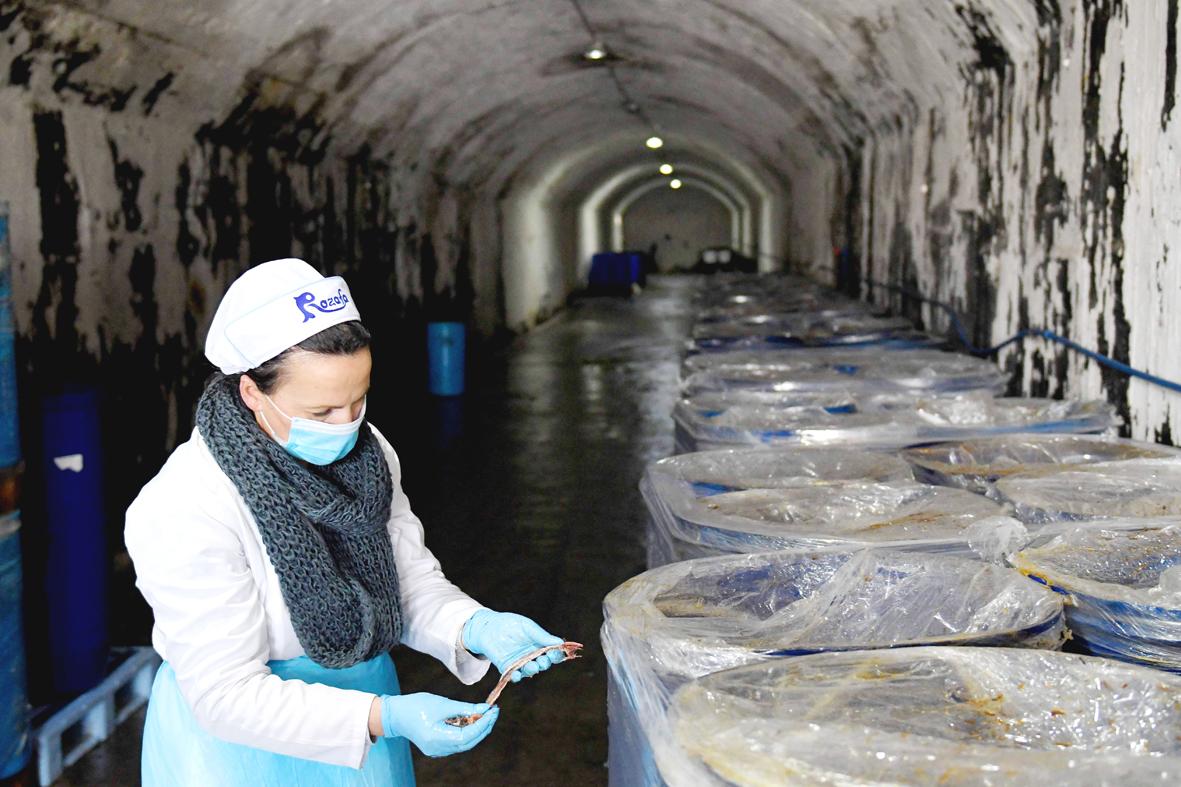In darkened tunnels once stuffed with weapons, there are now hundreds of blue barrels filled with anchovies resting in liters of brine, a surreal repurposing of Albania’s Cold War past.
Murals, statues, architectural oddities and historical relics greet visitors to Fish City, a complex snuggled into gentle hills in Labinot-Fushe, 60km south of the capital Tirana.
Jim Morrison and Winston Churchill rub shoulders, the stretched face of a Salvador Dali masterpiece is lovingly recreated alongside Pablo Picasso’s Guernica.

Photo :AFP
Before reaching any of that, Marlon Brando and Al Pacino in full Godfather mode have to be negotiated. The sprawling complex also houses a daycare, a children’s playground, cinema, fine-dining restaurant and a 50m tower called “chicken island.”
Somewhere in all of this, there is a seafood processing plant employing some 1,500 people, most of them women, who shell shrimp and fillet anchovies at incredible speed before ramming them into boxes, jars and bags for export.
The company, Rozafa, exported US$38 million of seafood last year, a major turnaround for a site that just six years ago stood derelict.
“In these places, there was nothing but ruins, it looked like Hiroshima after the bomb,” says owner Gjergj Luca, who built his city on the ruins of the base, but preserved the tunnels.
They were constructed by communist dictator Enver Hoxha, whose paranoia led him to isolate the country even from communist comrades in Moscow, Beijing and the former Yugoslavia.
He built up an unrivaled hoard of weaponry that stood idle for years in thousands of tunnels and bunkers following his death in 1985.
During a rebellion more than a decade later, crowds ransacked arms dumps across the country, getting their hands on roughly one million weapons, from machine guns and cannons to armored vehicles. Some of Hoxha’s tunnels and bunkers have since been transformed into cafes, shelters for homeless people, warehouses and most imaginatively, Fish City.
The complex is now redolent of 19th century utopian socialist projects in Britain and France, with Luca saying it is his “dream” to serve the community, not only with jobs but also with access to art and history.
“My dreams and my work have been transformed into a state of mind, a desire and a motivation for all of us,” says Luca, a former actor and son of Albanian screen legend Ndrek Luca, whose picture hangs alongside Pacino and Brando.
Business is going well for Luca, whose firm is the main employer in the area, paying the women roughly 20 euros a day for their work, the average salary for Albania.
He is working on transforming another military installation in the nearby town of Gramsh — formerly known as the “city of Kalashnikovs” — into another fish plant.
“Today we don’t need weapons to fight. Jobs and a better economic and social life is our real fight,” he says.
These complexes bind together Albania’s past and present, with the walls of the old barracks at Gramsh bearing communist slogans like “One hand on the pickaxe, the other on the rifle” or “Workers go from victory to victory.”
The Labinot-Fushe tunnels hark back to an even more distant era with a giant, gaudy sculpture of medieval national hero Skanderbeg sitting atop one of the entrances. “You don’t know where you’re going in and where you’re going out,” laughs anchovy packer Vjollca Kaculli, neatly encapsulating the Fish City experience.

Cheng Ching-hsiang (鄭青祥) turned a small triangle of concrete jammed between two old shops into a cool little bar called 9dimension. In front of the shop, a steampunk-like structure was welded by himself to serve as a booth where he prepares cocktails. “Yancheng used to be just old people,” he says, “but now young people are coming and creating the New Yancheng.” Around the corner, Yu Hsiu-jao (饒毓琇), opened Tiny Cafe. True to its name, it is the size of a cupboard and serves cold-brewed coffee. “Small shops are so special and have personality,” she says, “people come to Yancheng to find such treasures.” She

In July of 1995, a group of local DJs began posting an event flyer around Taipei. It was cheaply photocopied and nearly all in English, with a hand-drawn map on the back and, on the front, a big red hand print alongside one prominent line of text, “Finally… THE PARTY.” The map led to a remote floodplain in Taipei County (now New Taipei City) just across the Tamsui River from Taipei. The organizers got permission from no one. They just drove up in a blue Taiwanese pickup truck, set up a generator, two speakers, two turntables and a mixer. They

Former Chinese Nationalist Party (KMT) chairwoman Hung Hsiu-chu’s (洪秀柱) attendance at the Chinese Communist Party’s (CPP) “Chinese People’s War of Resistance Against Japanese Aggression and the World Anti-Fascist War” parade in Beijing is infuriating, embarrassing and insulting to nearly everyone in Taiwan, and Taiwan’s friends and allies. She is also ripping off bandages and pouring salt into old wounds. In the process she managed to tie both the KMT and the Democratic Progressive Party (DPP) into uncomfortable knots. The KMT continues to honor their heroic fighters, who defended China against the invading Japanese Empire, which inflicted unimaginable horrors on the

Hannah Liao (廖宸萱) recalls the harassment she experienced on dating apps, an experience that left her frightened and disgusted. “I’ve tried some voice-based dating apps,” the 30-year-old says. “Right away, some guys would say things like, ‘Wanna talk dirty?’ or ‘Wanna suck my d**k?’” she says. Liao’s story is not unique. Ministry of Health and Welfare statistics show a more than 50 percent rise in sexual assault cases related to online encounters over the past five years. In 2023 alone, women comprised 7,698 of the 9,413 reported victims. Faced with a dating landscape that can feel more predatory than promising, many in